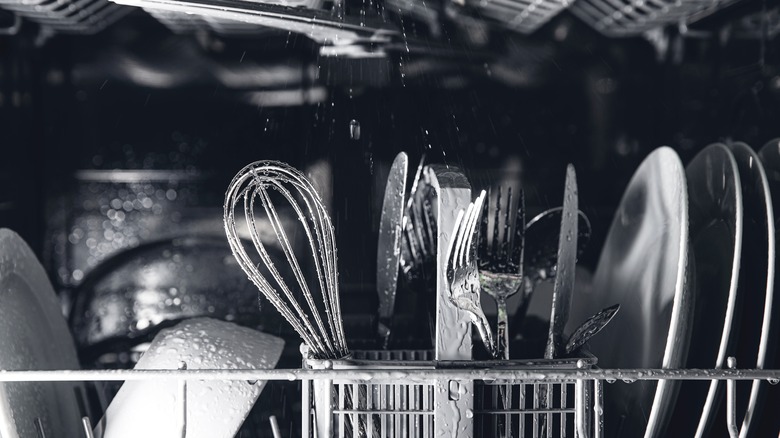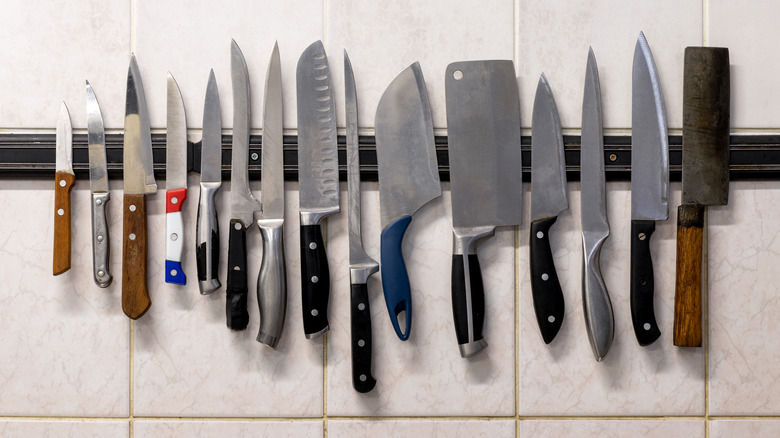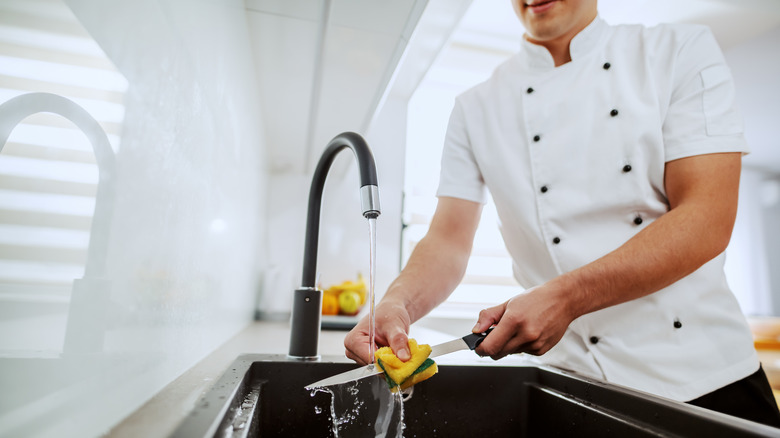Why You Need To Stop Running Your Knives Through The Dishwasher
Good knives are some of the most important kitchen tools — you'll use them for all kinds of slicing, from brunoise to chiffonade to julienne. And if you love to cook, you've probably invested in high-quality cutlery, which can last for decades (or even generations) if cared for properly (per HuffPost).
When you're cleaning up after cooking, it seems easy to throw everything in the dishwasher and get to the important part: eating. Not so fast, however. If you're putting your good knives in the dishwasher with the rest of your silverware and plates, you could be damaging them.
Dishwashers are awesome tools for cleaning and sanitizing dishes and silverware. But according to America's Test Kitchen, the conditions inside the machine that get your plates and forks squeaky-clean can be overkill for a high-quality kitchen knife. Putting your knives in the dishwasher can leave you with dull blades and damaged handles.
Materials matter
Knives are made of steel, which is also used to make fairly indestructible things, such as cars and buildings. So, why can't your blades withstand a simple cycle in the dishwasher? Not all steel is the same. And the types of steel used to make knives — usually stainless or carbon — are great for honing sharp, fine edges but are easily affected by heat, abrasive detergents, and exposure to water.
Michael J. Tarkanian, senior lecturer at MIT's Department of Materials Science and Engineering, told America's Test Kitchen that carbon and stainless steel knives are softer than the steel used in regular silverware and are vulnerable to corrosion when they're exposed to water. Even 10 minutes in a wet sink is detrimental to a carbon steel knife. Add to that, Wüsthof CEO Viola Wüsthof told Martha Stewart that machine washing and detergents are too abrasive and can make the metal rust, as well as degrade the knife handles.
Knives placed in a dishwasher can also knock into other cutlery and dishes, which can dull the edges. One of the main reasons we use cutting boards made from soft materials, such as wood and plastic, is to keep the edges sharp, explains The New York Times.
How to care for knives properly
Fortunately, taking care of your prized blades is pretty simple. First, wash them by hand with regular dish detergent and wipe them off immediately to dry to prevent any rusting. Don't put your knives in the sink to soak or to sit, because the blades stay wet (plus, you can easily cut your hand reaching into grab something else). Viola Wüsthof advises leaving your knives to the side of the sink in a dry spot until you're ready to wash them (via Martha Stewart).
Second, store your knives in a block or on a magnetized wall strip so they don't bang into each other, which can also dull your blades (per Lifehacker). (If you must use a drawer, invest in some plastic knife guards.) Third, keep a sharp edge on your blades by using a whetstone and a steel. You can get your knives professionally sharpened; however, you can also keep them in pretty good shape with a little regular maintenance with a home stone or sharpener and a hand steel. You can even touch up your edges in a pinch with the bottom of a ceramic coffee cup.
If your knives are already dull or rusty from running them through the dishwasher, don't give up on them entirely. Reach out to a professional cutler to see if they can rehab your knife; sometimes, even the rustiest old knife can come back to life.


